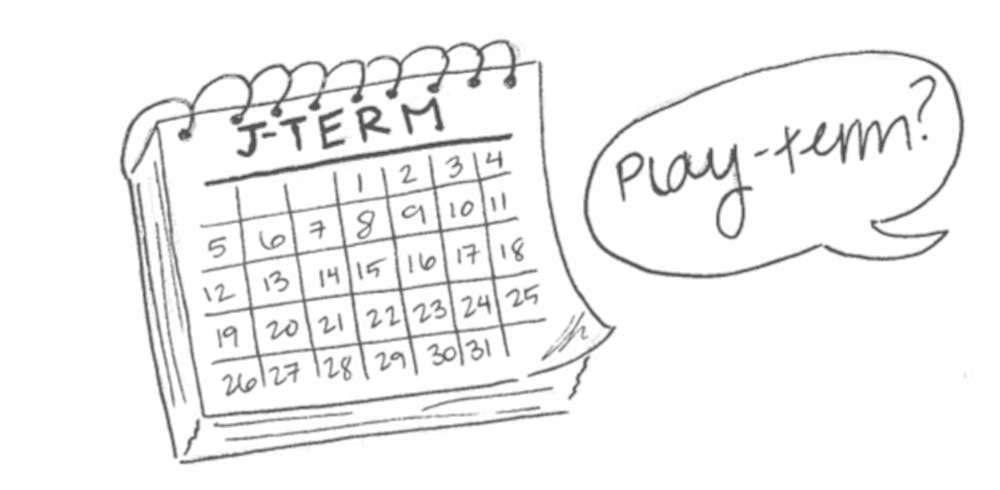Touring Middlebury, prospective students are told to be excited about J-term. “January is a chance to take a break,” we’ve heard tour guides explain, “to try things that are out of your comfort zone, or take on independent projects.” A similar narrative dominates once students actually get to campus; all throughout fall, new Midd Kids listen as upperclassmen float potential party themes for “J-term, play term” or deliberate over Vermont ski-pass purchases. They listen, too, as professors and club leaders allude to exciting J-term opportunities — classes where you make a movie rather than sit a final exam, say, or workshops that give you a chance to finally try bread-baking.
In light of these kinds of conversations, the average first year seems fairly justified in expecting the four weeks following winter break to rank among the best of their college experience. And for a lot of Middlebury students, this holds true: They walk out of J-term smiling beneath a fresh, freckly goggles tan, having picked up some extra sleep, an easy A and a couple of Instagram posts along the way.
For others, though, the return to spring semester is cause for relief. In fact, for a lot of us, the term “J-Term, play-term” carries with it an alienating, even cruel irony. Not only are the socioeconomic divisions and mental health stressors that make being at Middlebury difficult during regular term still at play, but those same dynamics are magnified, brought into sharp relief by cold weather, high expectations and a reduced class schedule. Still, because J-Term has been so successfully branded as a uniquely fulfilling social and academic experience, students often feel uncomfortable talking about January as anything less than a four week-long party.
As a board, we’re pretty fed up with this particular narrative. To be clear: A lot of us love J-Term, and valued our experiences last month as much as any we’ve had throughout college. Still, we believe it’s important to acknowledge and talk about the ways that, for a significant part of the Middlebury community, January is a month to be endured, not celebrated.
For one, the classic J-Term schedule-fillers — skiing, going to dinner, taking weekend trips to Montreal — do not run cheap, which can intensify existing socio-economic divisions within the student body. We acknowledge that those are only some of the many ways students pack their snowy January days, and that there are plenty of activities that don’t break the bank. But when the predominant narrative is that everyone is out “shredding,” it can be profoundly isolating. Off-campus, too, these socioeconomic disparities can come into play — CCI grants are not always sufficient for covering the costs of New York City internships or other for-credit opportunities.
J-Term also takes a serious toll on a lot of students’ mental health. As though cold weather and a lack of daylight wasn’t enough, a reduced class schedule often strips students of structure in their day-to-day lives. With less to do than usual, many retreat into their dorm rooms, alone. And, because people might assume they’re off skiing (or having other wintery, Vermont-based adventures), friends are often less likely to check up on them.
Some students find J-Term stressful in an entirely different way. While students often talk about January courses as “easy A”s, or more fun and less academically rigorous than normal Middlebury courses, this isn’t always the case. Really, there’s a striking disparity in workload across the January term course catalog. Where some students find themselves virtually flooded with free time, unfettered by homework, others (taking, say, intro languages course or finishing up their theses) spend much of the month in the library — being asked, all the while, why they aren’t off with their friends partying. Similarly, many clubs are markedly more active in January, working off of the assumption that members have little else to do. These kinds of disparity in experience only contribute to what can be, for some students, the most demanding month of the year.
And so J-Term isn’t always a “chance for a break,” or a fun and free time to pursue “things out of your comfort zone.” To make matters worse, students who struggle during January typically often feel uncomfortable sharing experiences that run contrary to the powerful narratives that push J-Term as pure, unadulterated fun.
To that end, we’re hoping to facilitate more nuanced discussions about J-Term, both to manage expectations and to let students know they aren’t alone in struggling. As part of our effort to create a realistic, constructive conversation around J-Term, we invite you to share your own experiences in the form of op-eds — whether that be the ways in which you find the month challenging, or coping mechanisms for sad, snowy days.
It’s OK if you spent most of last month looking forward to Feb break. You’re certainly not the only one.
Middlebury, magnified: reframing 'J-Term play term'

Comments



